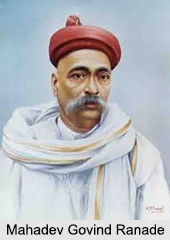 Born on 18th January, 1842, Mahadev Govind Ranade was an Indian scholar, social reformer and author. He was a non-believer in the caste system and the concept of untouchability. Mahadev Govind Ranade advocated social reforms such as the liberation of women and widow re-marriage. Being a Judge of the Bombay High Court in Maharashtra, Mahadev Govind Ranade not only advocated but exercised his powers to spread equality among sexes, right of education and protection of children, widows and agricultural workers against injustices.
Born on 18th January, 1842, Mahadev Govind Ranade was an Indian scholar, social reformer and author. He was a non-believer in the caste system and the concept of untouchability. Mahadev Govind Ranade advocated social reforms such as the liberation of women and widow re-marriage. Being a Judge of the Bombay High Court in Maharashtra, Mahadev Govind Ranade not only advocated but exercised his powers to spread equality among sexes, right of education and protection of children, widows and agricultural workers against injustices.
Early Life of Mahadev Govind Ranade
Born in one of India"s Chiptavan Brahmin family in Niphad, in the Nashik district, the father of Mahadev Govind Ranade was a minister. Mahadev Govind Ranade studied in a Marathi school in Kolhapur and later shifted to an English-medium school. At the age of 14, he went to study at Elphinstone College, Bombay. He belonged to the first batch of students at the University of Bombay. He secured his degree in the Bachelor of Arts in 1862 and 4 years later, secured his LLB.
Personal Life of Mahadev Govind Ranade
Mahadev Govind Ranade had been married for almost 20 years until his wife died, after which most of his fellow social reformers expected him to marry a widow. However, Mahadev Govind Ranade adhered to his family`s wishes and married a child bride from the Kurlekar family, Ramabai Ranade, whom he subsequently mentored and provided with an education. Ramabai Ranade became an important name in the history of Indian social reformers and was known to be the first women"s rights activist of the 19th century. Together Mahadev Govind Ranade and Ramabai did not have any children and after Mahadev"s death, she continued with her social and educational reform work.
Social Works of Mahadev Govind Ranade
Mahadev Govind Ranade was one of the founding fathers of the Indian National Congress party and owned several designations as member of the Bombay legislative council, member of the finance committee at the centre. During his life he helped to establish the Vaktruttvottejak Sabha, the Poona Sarvajanik Sabha and the Prarthana Samaj, and edited a Bombay Anglo-Marathi daily paper, the Induprakash, which was founded on his ideology of social and religious reform.
Mahadev Govind Ranade summarised the mission of the Indian social reform movement as to "Humanize, Equalize and Spiritualize". He campaigned against the `purdah` system (keeping women behind the veil).He was a founder of the Social Conference movement, which he supported till his last breath. He directed his social reform efforts against child marriage, the shaving of widows` heads, the heavy cost of marriages and other social functions, and the caste restrictions on travelling abroad, and he strenuously advocated widow remarriage and female education. Mahadev Govind Ranande was one of the founders of the Widow Marriage Association in 1861and was also responsible for building the oldest girls high school in Maharashtra by collaborating with Vaman Abaji Modak and historian Dr. R.G. Bhandarkar in the year 1885.
Works of Mahadev Govind Ranade
Other than being an Indian social reformer, Mahadev Govind Ranade was also an author and some of his most important works are mentioned below. One of his books titled "Rise of the Maratha Empire" was published in 1900 but was reprinted in 1999.
| Works of Govind Mahadev Ranade | Year |
| Rise of the Maratha Power | 1900 |
| Ranade?s Economic Writings New Delhi | 1990 |
| Essays on Indian Economics | 1900 |
| Introduction to the Peishwa`s Diaries | Unknown |






